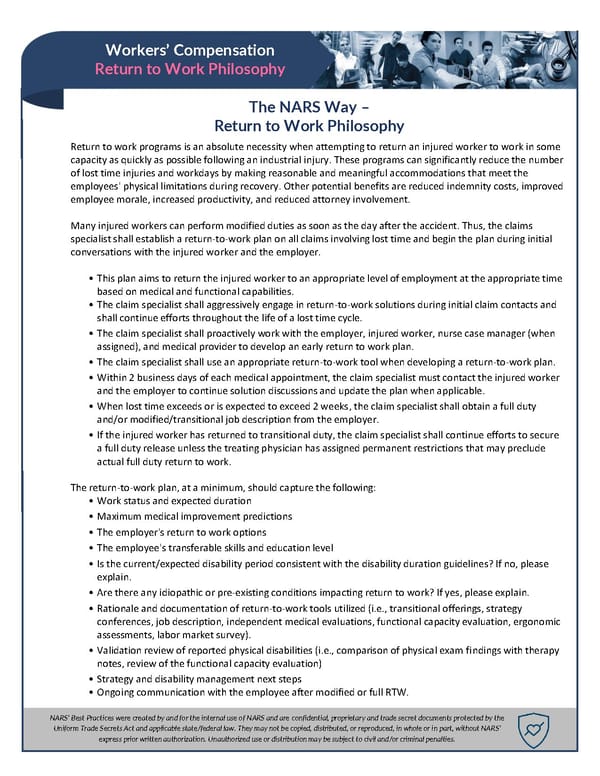Workers’ Compensation Return to Work Philosophy The NARS Way – Return to Work Philosophy Return to work programs is an absolute necessity when attempting to return an injured worker to work in some capacity as quickly as possible following an industrial injury. These programs can significantly reduce the number of lost time injuries and workdays by making reasonable and meaningful accommodations that meet the employees' physical limitations during recovery. Other potential benefits are reduced indemnity costs, improved employee morale, increased productivity, and reduced attorney involvement. Many injured workers can perform modified duties as soon as the day after the accident. Thus, the claims specialist shall establish a return-to-work plan on all claims involving lost time and begin the plan during initial conversations with the injured worker and the employer. • This plan aims to return the injured worker to an appropriate level of employment at the appropriate time based on medical and functional capabilities. • The claim specialist shall aggressively engage in return-to-work solutions during initial claim contacts and shall continue efforts throughout the life of a lost time cycle. • The claim specialist shall proactively work with the employer, injured worker, nurse case manager (when assigned), and medical provider to develop an early return to work plan. • The claim specialist shall use an appropriate return-to-work tool when developing a return-to-work plan. • Within 2 business days of each medical appointment, the claim specialist must contact the injured worker and the employer to continue solution discussions and update the plan when applicable. • When lost time exceeds or is expected to exceed 2 weeks, the claim specialist shall obtain a full duty and/or modified/transitional job description from the employer. • If the injured worker has returned to transitional duty, the claim specialist shall continue efforts to secure a full duty release unless the treating physician has assigned permanent restrictions that may preclude actual full duty return to work. The return-to-work plan, at a minimum, should capture the following: • Work status and expected duration • Maximum medical improvement predictions • The employer's return to work options • The employee's transferable skills and education level • Is the current/expected disability period consistent with the disability duration guidelines? If no, please explain. • Are there any idiopathic or pre-existing conditions impacting return to work? If yes, please explain. • Rationale and documentation of return-to-work tools utilized (i.e., transitional offerings, strategy conferences, job description, independent medical evaluations, functional capacity evaluation, ergonomic assessments, labor market survey). • Validation review of reported physical disabilities (i.e., comparison of physical exam findings with therapy notes, review of the functional capacity evaluation) • Strategy and disability management next steps • Ongoing communication with the employee after modified or full RTW. NARS’ Best Practices were created by and for the internal use of NARS and are confidential, proprietary and trade secret documents protected by the Uniform Trade Secrets Act and applicable state/federal law. They may not be copied, distributed, or reproduced, in whole or in part, without NARS’ express prior written authorization. Unauthorized use or distribution may be subject to civil and/or criminal penalties.
 Y(Our) Workers' Compensation Guidebook - The NARS Way Page 35 Page 37
Y(Our) Workers' Compensation Guidebook - The NARS Way Page 35 Page 37